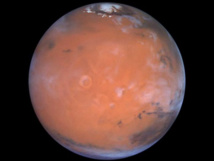He said his company SpaceX aims to land two cargo ships on the Red Planet by 2022 to place power, mining and life support systems for future flights.
"That's not a typo," he said, referring to the date, just 5 years from now. "Although it is aspirational," Musk added.
Two years later, the first ship carrying crews would arrive, he said. The journey to Mars currently takes about eight months.
"From there the Martian settlement could just get bigger and bigger," he said, adding the BFR spaceship could also be used to service the International Space Station and for a future project to establish a "village" on the Moon.
"The future is vastly more exciting and interesting if we are a multi-planet species than if we are not," Musk told some 3,000 attendees at the conference.
The rocket will stand 100 metres tall with 31 engines to lift a payload of more than 4,000 tons into space. The spaceship will be 48 metres long and feature 40 cabins that could carry three people each.
SpaceX plans to start building the first spaceship by the middle of next year, he said, adding the cost could be brought down by reusing parts and improving technology.
"It's really crazy that we build these sophisticated rockets and then crash them every time we fire," he said. "It really shows how fundamental re-usability is."
Musk said the same technology could be adapted for transportation on earth between major cities, as BFR could travel up to 27,000 km per hour, cutting the longest journeys on earth to less than 30 minutes.
The 68th annual congress is a meeting of the world's space industry. Some of the scientists in attendance lauded Musk's announcement.
"Reusing and recycling seem to be at the heart of the new approach that Musk is taking. The science behind this is realistic," said Charley Lineweaver, an associate professor of earth sciences at the Australian National University.
"The unrealistic part - the thing holding us back - has always been finding the political will to invest in space," he said.
Jasmina Lazendic-Galloway, a lecturer of physics and astronomy at Monash University, said the "time-frame is aspirational, but does not seem impossible."
Earlier on Friday, US aerospace company Lockheed Martin announced at the conference their own plan to establish a six-person space station called Mars base camp in the orbit around the Red Planet by 2028.
According to the plan, astronauts on the space station could carry out scientific research and exploration work.
The company also showed a design of a Mars lander spacecraft designed to ferry astronauts between the orbiting base camp and the planet's surface and also to allow exploration of its two moons.
--------------------------------------------------------------------------------------------------------------------------
"That's not a typo," he said, referring to the date, just 5 years from now. "Although it is aspirational," Musk added.
Two years later, the first ship carrying crews would arrive, he said. The journey to Mars currently takes about eight months.
"From there the Martian settlement could just get bigger and bigger," he said, adding the BFR spaceship could also be used to service the International Space Station and for a future project to establish a "village" on the Moon.
"The future is vastly more exciting and interesting if we are a multi-planet species than if we are not," Musk told some 3,000 attendees at the conference.
The rocket will stand 100 metres tall with 31 engines to lift a payload of more than 4,000 tons into space. The spaceship will be 48 metres long and feature 40 cabins that could carry three people each.
SpaceX plans to start building the first spaceship by the middle of next year, he said, adding the cost could be brought down by reusing parts and improving technology.
"It's really crazy that we build these sophisticated rockets and then crash them every time we fire," he said. "It really shows how fundamental re-usability is."
Musk said the same technology could be adapted for transportation on earth between major cities, as BFR could travel up to 27,000 km per hour, cutting the longest journeys on earth to less than 30 minutes.
The 68th annual congress is a meeting of the world's space industry. Some of the scientists in attendance lauded Musk's announcement.
"Reusing and recycling seem to be at the heart of the new approach that Musk is taking. The science behind this is realistic," said Charley Lineweaver, an associate professor of earth sciences at the Australian National University.
"The unrealistic part - the thing holding us back - has always been finding the political will to invest in space," he said.
Jasmina Lazendic-Galloway, a lecturer of physics and astronomy at Monash University, said the "time-frame is aspirational, but does not seem impossible."
Earlier on Friday, US aerospace company Lockheed Martin announced at the conference their own plan to establish a six-person space station called Mars base camp in the orbit around the Red Planet by 2028.
According to the plan, astronauts on the space station could carry out scientific research and exploration work.
The company also showed a design of a Mars lander spacecraft designed to ferry astronauts between the orbiting base camp and the planet's surface and also to allow exploration of its two moons.
--------------------------------------------------------------------------------------------------------------------------









 Home
Home Politics
Politics











